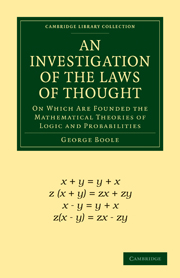 An Investigation of the Laws of Thought
An Investigation of the Laws of Thought Published online by Cambridge University Press: 05 November 2011
ON CERTAIN METHODS OF ABBREVIATION.
1. Though the three fundamental methods of development, elimination, and reduction, established and illustrated in the previous chapters, are sufficient for all the practical ends of Logic, yet there are certain cases in which they admit, and especially the method of elimination, of being simplified in an important degree; and to these I wish to direct attention in the present chapter. I shall first demonstrate some propositions in which the principles of the above methods of abbreviation are contained, and I shall afterwards apply them to particular examples.
Let us designate as class terms any terms which satisfy the fundamental law V (1 – V) = 0. Such terms will individually be constituents; but, when occurring together, will not, as do the terms of a development, necessarily involve the same symbols in each. Thus ax + bxy + cyz may be described as an expression consisting of three class terms, x, xy, and yz, multiplied by the coefficients a, b, c respectively. The principle applied in the two following Propositions, and which, in some instances, greatly abbreviates the process of elimination, is that of the rejection of superfluous class terms; those being regarded as superfluous which do not add to the constituents of the final result.
PROPOSITION I.
2. From any equation, V= 0, in which V consists of a series of class terms having positive coefficients, we are permitted to reject any term which contains another term as a factor, and to change every positive coefficient to unity.
To save this book to your Kindle, first ensure no-reply@cambridge.org is added to your Approved Personal Document E-mail List under your Personal Document Settings on the Manage Your Content and Devices page of your Amazon account. Then enter the ‘name’ part of your Kindle email address below. Find out more about saving to your Kindle.
Note you can select to save to either the @free.kindle.com or @kindle.com variations. ‘@free.kindle.com’ emails are free but can only be saved to your device when it is connected to wi-fi. ‘@kindle.com’ emails can be delivered even when you are not connected to wi-fi, but note that service fees apply.
Find out more about the Kindle Personal Document Service.
To save content items to your account, please confirm that you agree to abide by our usage policies. If this is the first time you use this feature, you will be asked to authorise Cambridge Core to connect with your account. Find out more about saving content to Dropbox.
To save content items to your account, please confirm that you agree to abide by our usage policies. If this is the first time you use this feature, you will be asked to authorise Cambridge Core to connect with your account. Find out more about saving content to Google Drive.